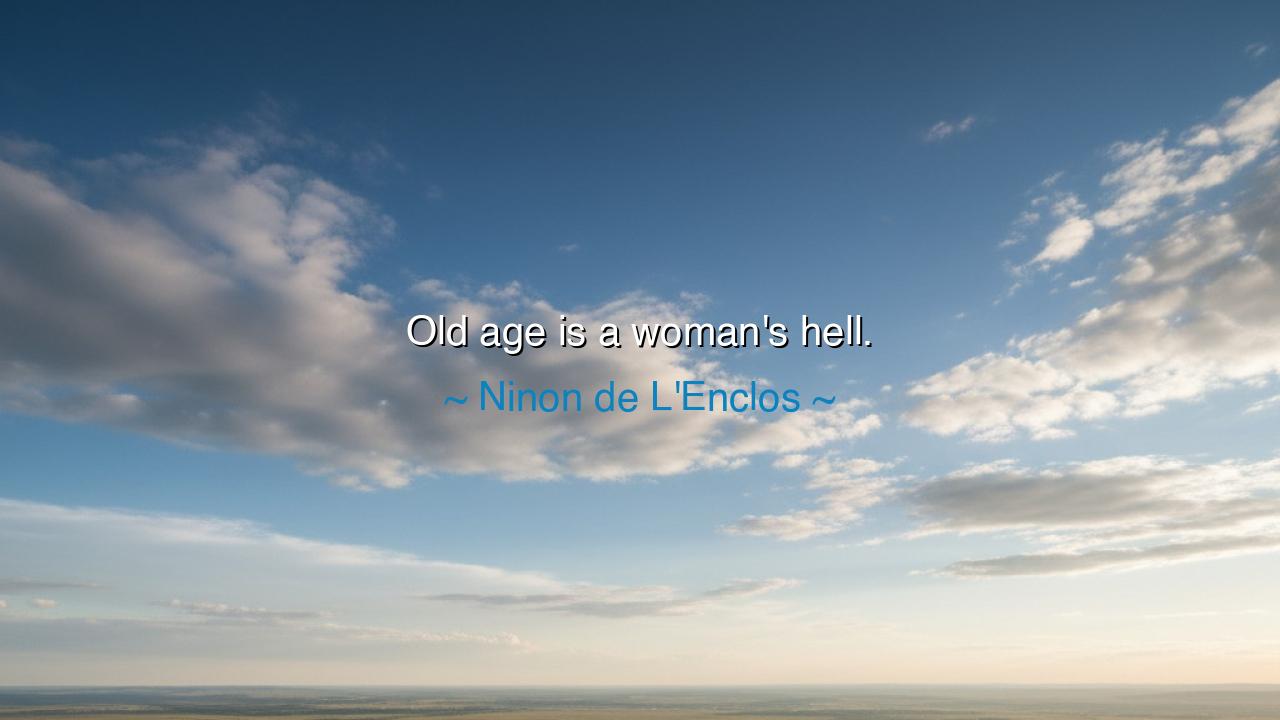
Old age is a woman's hell.






In the shadowed corridors of history, where the stories of men and women intertwine, there comes a truth that is rarely spoken, yet deeply felt. It is the truth that old age, for a woman, can be an unforgiving place. Ninon de L'Enclos, the famous courtesan and philosopher of France, captured this painful reality when she proclaimed, “Old age is a woman’s hell.” Her words are not a mere lament, but a reflection of the profound struggle that women face as the years advance, a struggle that transcends time and culture. For in the eyes of many societies, the value of a woman has often been defined by her youth, her beauty, and the vitality of her spirit—qualities that fade with the passage of time.
To understand the depth of de L'Enclos’ words, we must look back at the roles that women have been forced to play throughout history. From the dawn of civilization, women were celebrated not for their wisdom or achievements, but for their ability to bear children, to nurture families, and to provide beauty and grace to the world around them. In a world where youth and fertility were prized above all else, the aging woman was often seen as irrelevant, invisible, or even burdensome. Her value diminished as she grew older, and her role in society became less clear. To grow old, for a woman, was not a natural progression but a curse, a stripping away of her power, her beauty, and her worth.
In the ancient world, we see this harsh reality reflected in the lives of many women. Cleopatra, the last queen of Egypt, known for her intellect, beauty, and political acumen, was ultimately betrayed by the passing of time. As she grew older, her ability to maintain the powerful relationships that had once served her began to wane. The world that had once revered her youth and beauty turned away as she entered the twilight of her years. Similarly, Sappho, the famed poet of ancient Greece, whose works celebrated love and desire, faced the inevitable decline that came with age. Though her poetry transcended time, the recognition of her contributions was often overshadowed by the focus on the youthful beauty that she once embodied.
But let us not be misled into thinking that old age for a woman is merely a physical matter. The true tragedy of this passage is that society often fails to value the wisdom and experience that come with the years. Ninon de L'Enclos, despite being a woman of extraordinary intellect and influence in her time, understood the bitter reality that the world would not look kindly upon her when the years began to take their toll. In her famous courtesan career, her youth had been her currency. Yet, as time wore on, the fleeting nature of this beauty became more apparent. In a world that worshipped youth, she too was vulnerable to the ravages of time—a haunting truth that few women of her era could escape.
There is also a profound emotional and psychological weight that old age carries for a woman. In the final years of life, when the world has turned its gaze elsewhere, many women experience the deep loneliness of being forgotten, unseen, or disregarded. The world may celebrate the achievements of men, but it often overlooks the quiet accomplishments of women. The loss of physical beauty, so often the central measure of a woman’s worth in society, creates a profound sense of invisibility. The very qualities that made a woman powerful in her youth—her attractiveness, her vibrancy, her ability to inspire desire—fade away, leaving behind the unspoken question: who is she now?
Yet, it is not all despair. Ninon de L'Enclos's words also carry an unspoken challenge to all women who face the passage of time: to embrace the wisdom and power that age brings. For there is a truth hidden beneath the surface of her lament: old age is not just a woman’s hell; it is also an opportunity. Wisdom, the fruits of a life fully lived, often comes with age. The woman who has lived long enough to witness the trials of life, to experience both love and loss, gains a depth of understanding that cannot be attained in youth. It is a wisdom that is often overlooked but can offer a profound sense of peace and strength.
In our own lives, let us learn to honor the experiences of those who have come before us, who have weathered the storms of age with grace and dignity. Let us value the wisdom that comes with time, especially in the women around us who have borne the weight of society’s expectations. The lesson of de L'Enclos's words is clear: age need not be a woman’s hell, but rather the final act of a life well-lived. Instead of seeing it as a decline, we must recognize the strength, the grace, and the knowledge that come with years. For in those years, the woman who has lived fully carries within her the essence of life itself—the courage to face the world without the crutch of youth, and the power to leave a legacy that transcends time. Let us honor the elder women in our lives, for they are the true keepers of wisdom, the ones who have survived, thrived, and shaped the world with their resilience.






AAdministratorAdministrator
Welcome, honored guests. Please leave a comment, we will respond soon